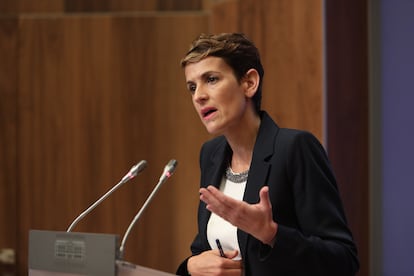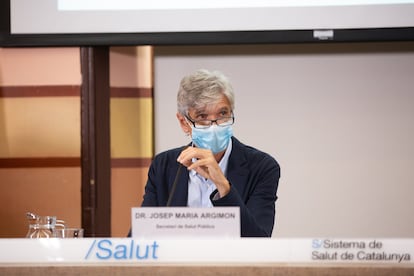Several Spanish regions announce new measures to curb coronavirus spread
Navarre, Catalonia and Andalusia say citizens should prepare for restrictions, while Madrid hopes to emerge from the state of alarm in 15 days


Following the perimetral confinement introduced in Madrid last Friday, more Spanish regions with rising contagion rates on Sunday announced new restrictions to curb the spread of the coronavirus. These include Navarre, Catalonia and Andalusia.
As for Madrid, Spanish Prime Minister Pedro Sánchez said on Saturday that he has no plans to try to extend the state of alarm beyond two weeks – something that would require a parliamentary support that is not guaranteed.
Speaking from Guarda, in Portugal, Sánchez said the state of alarm was an emergency solution triggered by lack of sufficient action by regional authorities. “Let’s hope that in 15 days the pandemic can be controlled,” he said, adding that in that time they are hoping to “not so much flatten the curve, but at least contain it.”
Meanwhile, Madrid authorities have expanded restrictions of their own to four areas located within the municipalities of Colmenar Viejo, Arganda del Rey, Coslada and Collado Villalba.
Navarre is rolling out measures that still fall short of the mobility restrictions imposed on the Spanish capital and nine other cities in the Madrid region last Friday. But Navarrese authorities said they are not ruling out tougher action if contagion rates remain high.
In Catalonia, health officials warned about “very tough weeks up ahead” and encouraged remote work and study as citizens awaited specific measures to be announced. But sources in the Catalan health department said they are ruling out a perimeter control around the entire region.
An on Monday, Andalusian premier Juan Manuel Moreno announced that his government will approve “more restrictive measures” in Granada due to a spike in coronavirus cases. He also urged young people to act responsibly.
These moves come on the back of a political and legal battle playing out in the Madrid region over how best to contain the spread of the virus while protecting the economy. On Friday, the central government – headed by a center-left coalition of the Socialist Party (PSOE) and Unidas Podemos – introduced a state of alarm against the wishes of the Madrid regional administration, controlled by a center-right alliance of the Popular Party (PP) and Ciudadanos (Citizens) with support from the far-right Vox.
Restrictions in Navarre

Under the new measures announced by Navarre premier María Chivite and applicable for 15 days starting on Tuesday, bars and restaurants have to close by 10pm and capacity is reduced to 30% indoors and 50% outdoors. As for social gatherings, a maximum of six people may meet either in private or public settings.
Navarre is now the region with the highest 14-day cumulative number of coronavirus cases, at 675 cases for every 100,000 inhabitants according to the latest report by the Health Ministry. That is almost three times the national average of 258.
While the incidence rate in Navarre is higher than in Madrid, the northern region is doing better on other key indicators such as the percentage of PCR tests coming back positive (11% versus 18%) and on intensive care beds occupied by Covid-19 patients (23% versus nearly 40%).
Chivite, of the Navarrese branch of the Socialist Party, also said that she did not want to “make political fire” out of the new restrictions on business activity and social gatherings. Asked about the PP’s complaints that Madrid is being confined with a lower coronavirus incidence than Navarre’s, Chivite noted that her region is doing much better in terms of intensive care bed occupancy.
“In Madrid, a state of alarm was also imposed because the regional premier was not taking measures,” she added, alluding to Isabel Díaz Ayuso of the PP. “We have to act responsibly to avoid mobility restrictions that we have not introduced this time, but which we are not ruling out in future.”
Tough weeks in Catalonia

Meanwhile, Catalan authorities are warning about “very tough weeks ahead.” While the 14-day cumulative incidence is below the national average at 212 cases per 100,000 inhabitants, cases are rising at an alarming rate. In Catalonia, the positivity rate is 7% while 17% of intensive care beds are occupied by Covid-19 patients.
Specific measures have not been announced yet, but they are expected to last 15 days as well. Health officials have already asked companies to let employees work from home and universities to offer remote learning, particularly since most transmission is taking place within the 20-to-29 age group.
The negative epidemiological data in Catalonia’s Vallès Occidental area, which is home to two of the region’s largest cities, Sabadell and Terrassa, are forcing Catalan authorities to consider special measures to curb contagion.
Acting premier Pere Aragonès, who took over the reins of the regional government after Quim Torra was temporarily barred from public office by Spain’s Supreme Court, said on Monday that the government is analyzing measures that will be announced in the coming days. “Let’s help the health system maintain it ability to respond,” he asked citizens.
“We don’t need a decision from a judge, but we do need awareness from everyone,” said Josep Maria Argimon, the Catalan secretary of public health, alluding to the legal battle in Madrid over coronavirus restrictions in the capital and surrounding municipalities.
“We will not get to the place where Madrid is right now if we implement measures, but if we don’t, the virus will surely get out of control and in two to three weeks we will be in the same situation,” said Argimon, speaking on the radio station Rac1.
Argimon also asked citizens to reduce their own social interaction as much as possible, instead of trying to get around the rules limiting the size of gatherings. “There can be eight of us sitting at two separate tables at an outdoor café, but the virus does not play along with these tricks, and only we ourselves can stop it, because interaction is the social breeding ground of the virus.”
New restrictions in Madrid
The Madrid government on Saturday announced mobility restrictions on four other basic health zones – areas smaller than a city district – in the towns of Colmenar Viejo, Arganda del Rey, Coslada and Collado Villalba. The decision was taken because the 14-day cumulative number of coronavirus cases in these areas exceeded 750 infections per 100,000 inhabitants, which is the new benchmark (it was previously set at 1,000 cases per 100,000).
This brings up to seven the total number of basic health zones in the Madrid region with restricted mobility. However, these areas are not affected by the broader state of alarm decreed by the central government for the Madrid region, and which applies to entire municipalities with a population of at least 100,000.
Yet the restrictions on mobility are similar in both cases. Residents are urged to limit their movement within these zones to essential activities, while trips in and out of the areas must be “duly justified.” Accepted reasons include going to work or school, medical appointments, caring for dependent individuals and trips to the bank, among others. Social gatherings are limited to six people, and there are restrictions on capacity at stores, bars and restaurants, places of worship and funeral homes.
DIFFERENT RESTRICTIONS
“The goal of perimeter confinements is to prevent a high-incidence zone from extending the virus to the surrounding areas, while restrictions on capacity are trying to contain the epidemic within a zone,” he says.
With reporting by Pedro Gorospe, Alfonso L. Congostrina, Elena G. Sevillano and Carlos E. Cué
English version by Susana Urra.
Tu suscripción se está usando en otro dispositivo
¿Quieres añadir otro usuario a tu suscripción?
Si continúas leyendo en este dispositivo, no se podrá leer en el otro.
FlechaTu suscripción se está usando en otro dispositivo y solo puedes acceder a EL PAÍS desde un dispositivo a la vez.
Si quieres compartir tu cuenta, cambia tu suscripción a la modalidad Premium, así podrás añadir otro usuario. Cada uno accederá con su propia cuenta de email, lo que os permitirá personalizar vuestra experiencia en EL PAÍS.
¿Tienes una suscripción de empresa? Accede aquí para contratar más cuentas.
En el caso de no saber quién está usando tu cuenta, te recomendamos cambiar tu contraseña aquí.
Si decides continuar compartiendo tu cuenta, este mensaje se mostrará en tu dispositivo y en el de la otra persona que está usando tu cuenta de forma indefinida, afectando a tu experiencia de lectura. Puedes consultar aquí los términos y condiciones de la suscripción digital.








































